These female Nobel Prize winners' momentous, diverse achievements have impacted the world far more than we realize.
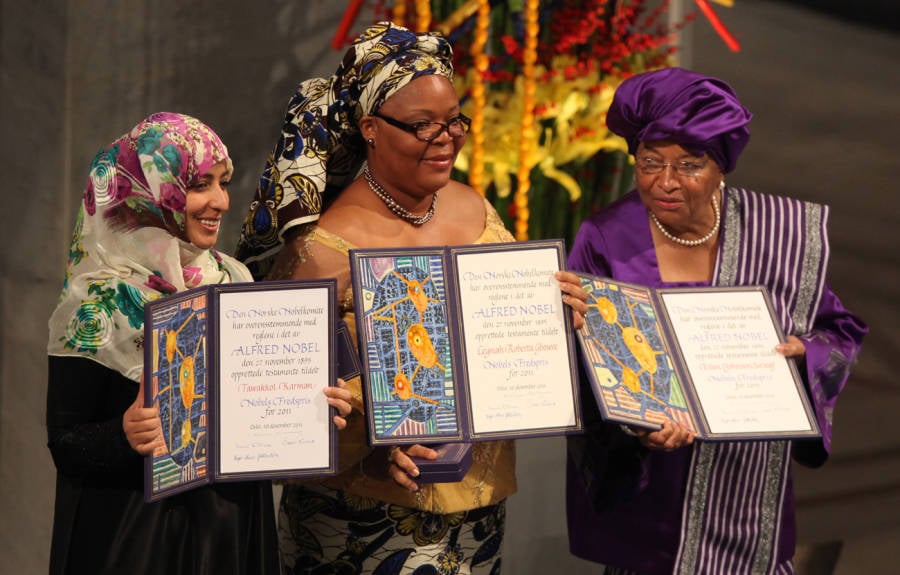
(Left to right) Tawakel Karman, Leymah Gbowee and Ellen Johnson Sirleaf share the 2011 Nobel Peace Prize for their non-violent work protecting women’s rights. Image Source: Wikimedia Commons
Throughout history, the scientific and artistic achievements of men have always been renowned and honored by the cognoscenti and the public alike. More often than not, however, women who work as doctors, engineers, writers, and scientists find themselves fighting a seemingly endless battle to gain recognition within their male-dominated industries, sometimes even losing credit for their work in the process.
Although some of these brilliant women have ultimately been honored with Nobel Prizes for their work—starting with distinguished scientist Marie Curie in 1903—many have since been lost within the recesses of history.
In honor of the anniversary of Curie becoming the first woman to win a Nobel Prize, here are some of the most extraordinary female Nobel Prize winners whose achievements have, whether we realize it or not, greatly impacted the world:
Female Nobel Prize Winners: Youyou Tu
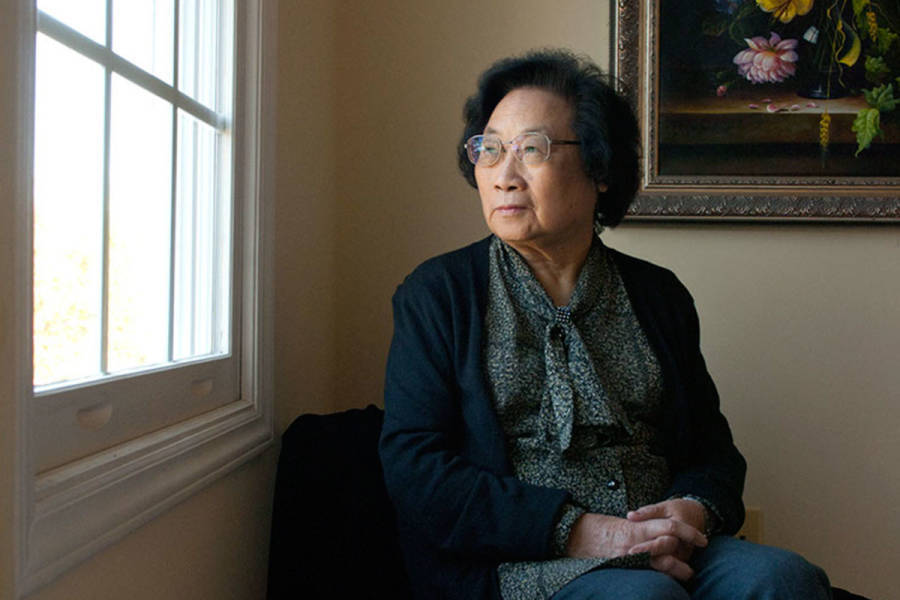
Image Source: New Scientist
“The 2.5-year training guided me to the wonderful treasure to be found in Chinese medicine and toward understanding the beauty in the philosophical thinking that underlies a holistic view of human beings and the universe.” — Youyou Tu
Winning a Nobel Prize in medicine without any kind of medical degree or doctorate may seem like an impossible feat, but for one woman living in China, the impossible became a reality. Malaria had decimated not only the Chinese army fighting in the Vietnam War, but also the civilian population residing within the dense rainforests of Southern China. The situation was only made more difficult due to bans on Western medical practices; traditional Chinese medicine was the only solution.
Youyou Tu, then a researcher at the Academy of Traditional Chinese Medicine in Beijing, was asked by Chinese leader Mao Zedong himself to find a homeopathic solution to the malaria problem, a task at which countless scientists before her had failed. After poring over more than 500 ancient texts, she isolated a component within sweet wormwood called artemisinin that effectively fought the disease.
Despite her incredible triumph, she went largely unheralded and unnoticed until 2011, when she received the prestigious Lasker-DeBakey Clinical Medical Research Award. Upon receiving it, the then 80-year-old Tu remarked simply, “I am too old to bear this.” Earlier this year, she was chosen as the recipient for the Nobel Prize in Medicine or Physiology.
Christiane Nüsslein-Volhard
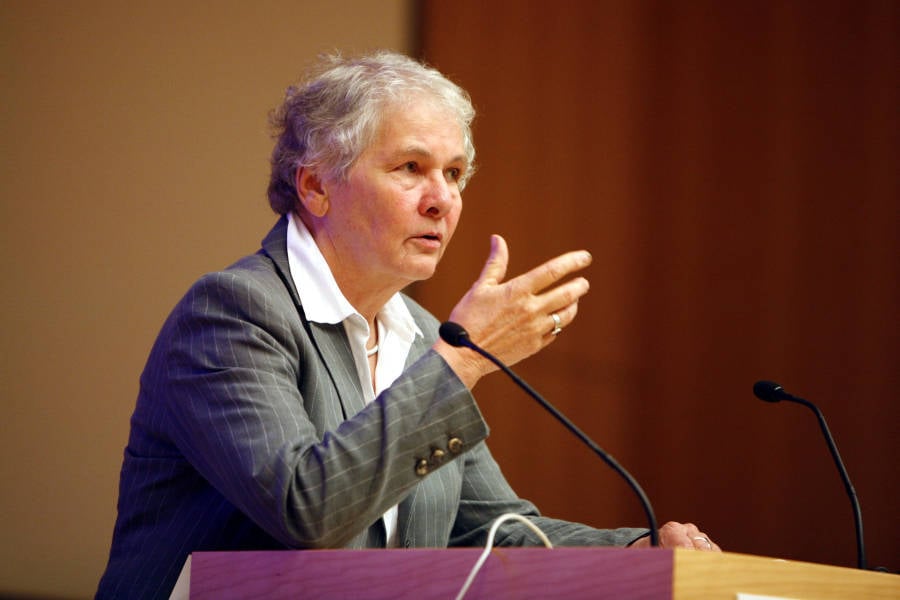
Image Source: Wikimedia Commons
“I immediately loved working with flies. They fascinated me, and followed me around in my dreams.” — Christiane Nüsslein-Volhard
Modern scientists have little difficulty understanding the nature of how babies are formed within the womb. From conception to birth, they have a thorough understanding of how human beings are built at their earliest stages–and it’s all thanks to Christiane Nüsslein-Volhard.
With the help of her fruit fly research specimens, Volhard, a German biologist, was able to discover which specific genes go on to form which specific body parts. After amassing an impressive collection of awards and commendations, Volhard won the Nobel Prize in Medicine or Physiology in 1995. To this day, her work continues to shape our understanding of the formation of human bodies and the occurrence of birth defects.
Female Nobel Prize Winners: Toni Morrison
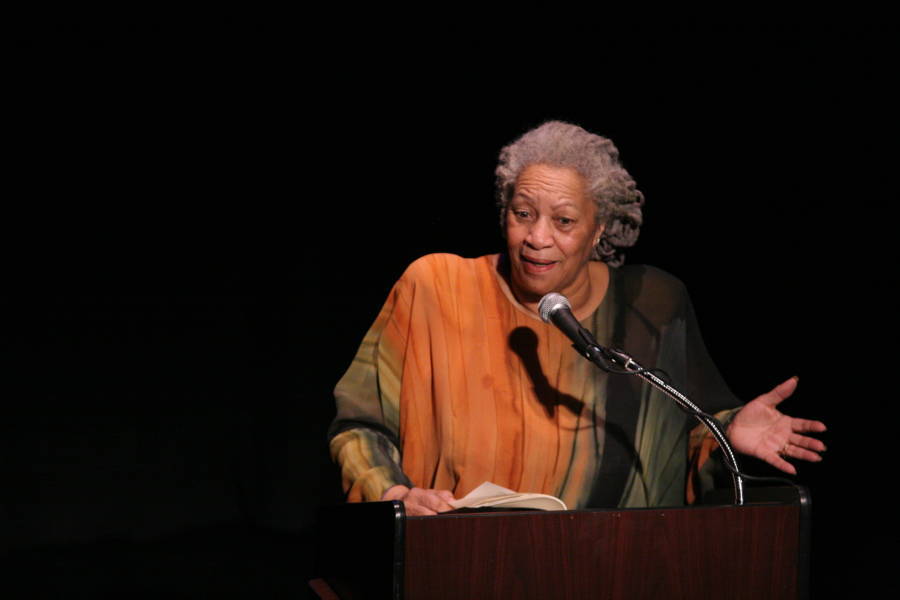
Image Source: Wikimedia Commons
“The ability of writers to imagine what is not the self, to familiarize the strange and mystify the familiar, is the test of their power.” — Toni Morrison
Toni Morrison stands as one of the most prominent figures in American literature. Her brave work expressed, among other things, the struggle for women of color in a primarily white, male-dominated society. Thus, novels like The Bluest Eye, Sula, and Beloved have become modern classics. Beloved, in particular, has received a wealth of praise, with The New York Times Book Review naming it the best American novel of the previous 25 years in 2006.
After winning a plethora of awards–including the National Book Critics Circle Award and the Pulitzer Prize for Fiction–throughout the 1970s and 1980s, Morrison received the Nobel Prize in Literature in 1993.
Upon receiving the prize, her citation aptly read: “Toni Morrison, who in novels characterized by visionary force and poetic import, gives life to an essential aspect of American reality.”
Nelly Sachs
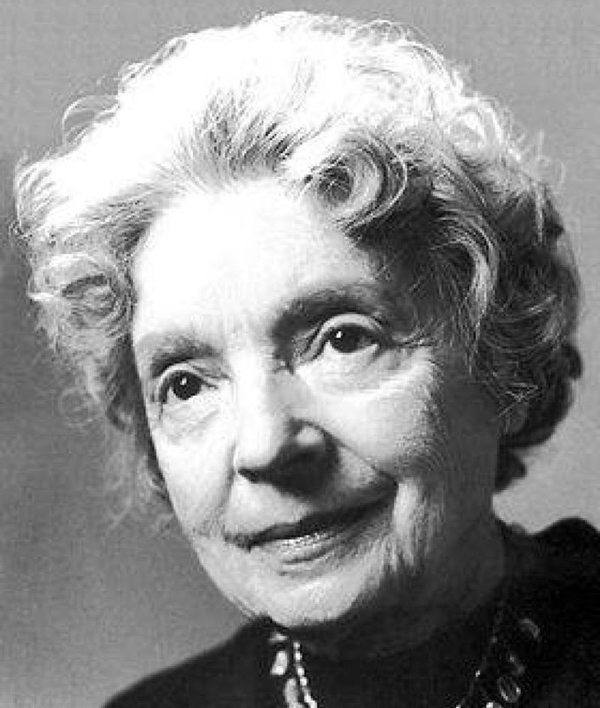
Image Source: Wikimedia Commons
“Whoever comes from the Earth reaching for the moon or other heavenly mineral flower–will soar high” — Nelly Sachs
The litany of atrocities committed during World War II inspired countless writers, artists, and survivors to lift their pens and share their stories with the world. For Nelly Sachs, a German-Jewish poet, inspiration struck after she fled from her homeland to Sweden in order to escape the Nazis–a week before she was due to report to a concentration camp. Her poems and plays dramatically captured the suffering and tragedy of her fellow German-Jews with a grim, yet lyrical style of writing.
Although she wrote consistently, the trauma of her experiences under the Nazis haunted her long after the war. At one point, she spent several years in a mental institution, but continued to write whilst there. By the 1960s, her work was widely celebrated, even in Germany, where the Nelly Sachs Prize for literature was inaugurated. In 1966, she herself won the Nobel Prize in Literature, stating, “I represent the tragedy of the Jewish people.”
Female Nobel Prize Winners: Tawakkol Karman
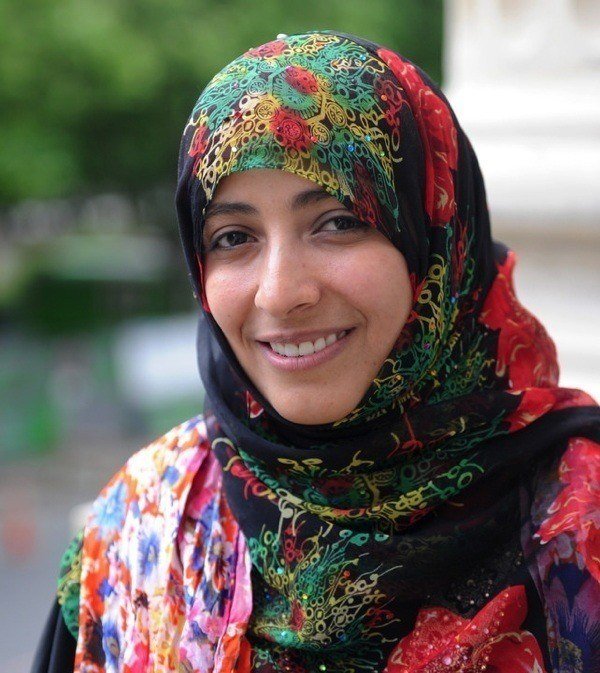
Image Source: Flickr
“The solution to women’s issues can only be achieved in a free and democratic society in which human energy is liberated, the energy of both women and men together. Our civilization is called human civilization and is not attributed only to men or women.” — Tawakkol Karman
With everything from her religion to her politics to, of course, her gender stacked against her, Tawakkol Karman’s incredible accomplishments demonstrate a profound bravery that is rarely seen in this world–even among Nobel Prize winners. Growing up in civil war-afflicted Yemen, Karman bore witness to the injustices carried out against her people. But this seemed only to strengthen her resolve and compel her toward a life of courage and compassion.
Aside from becoming a journalist and reporting over 50 cases of wrongfully imprisoned authors and writers, she founded, in 2005, an organization to specifically help empower and educate fellow female journalists: Women Journalists Without Chains. After Karman and the group began publishing material critical of the current Yemeni government, she began receiving a torrent of threats–including death threats. Yet she remained strong.
When the tide of anti-government protests peaked amid the Arab Spring revolutions of 2011, Karman appropriately took her place among the leaders of the Yemeni uprisings. Fittingly, Karman’s impact earned her the honorific, “The Mother of Revolution.” And in December 2011, her actions earned her the Nobel Peace Prize–of which she was, at the time, the youngest recipient ever.
Leymah Gbowee
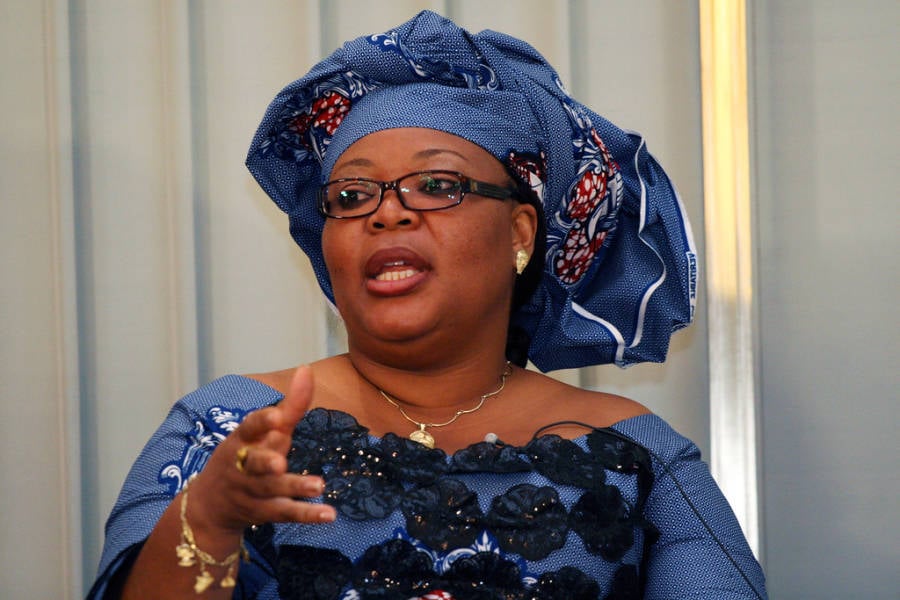
Image Source: Flickr
“There is something in this world that every individual can do. God has created all of us with something unique to contribute.” — Leymah Gbowee
During the Second Liberian Civil War, in 2003, Leymah Gbowee changed the fate of her country when she called upon women of all religions to unite and take a stand for peace. That anyone would have the strength to unite the region’s divided religious groups in a peace movement is remarkable; that it was a woman was both miraculous and unprecedented.
Originally a social worker who provided aid to child soldiers, Gbowee led the Women of Liberia Mass Action for Peace organization, rallying thousands of women in protest against the tyranny of President Charles Taylor and the warring factions that were tearing the country apart. Day in and day out, Gbowee led thousands of women in nonviolent protests.
At one point she went as far as creating a human barrier around a meeting hall and threatening to undress herself should authorities try to arrest her. On April 23, 2003, Taylor allowed the women to address him personally, and Gbowee was of course chosen as their representative. She stood in front of Taylor and said:
“We are tired of war. We are tired of running. We are tired of begging for bulgur wheat. We are tired of our children being raped. We are now taking this stand, to secure the future of our children. Because we believe, as custodians of society, tomorrow our children will ask us, ‘Mama, what was your role during the crisis?'”
By August, the war ended, Taylor resigned, and Liberia had peace for the first time in 14 years. Just two years later, Liberia elected Ellen Johnson Sirleaf, who had been one of Gbowee’s chief allies during the protests, as president—the first elected female leader of an African country. In 2011, Gbowee and Sirleaf (along with Tawakkol Karman) were awarded the Nobel Peace Prize.





